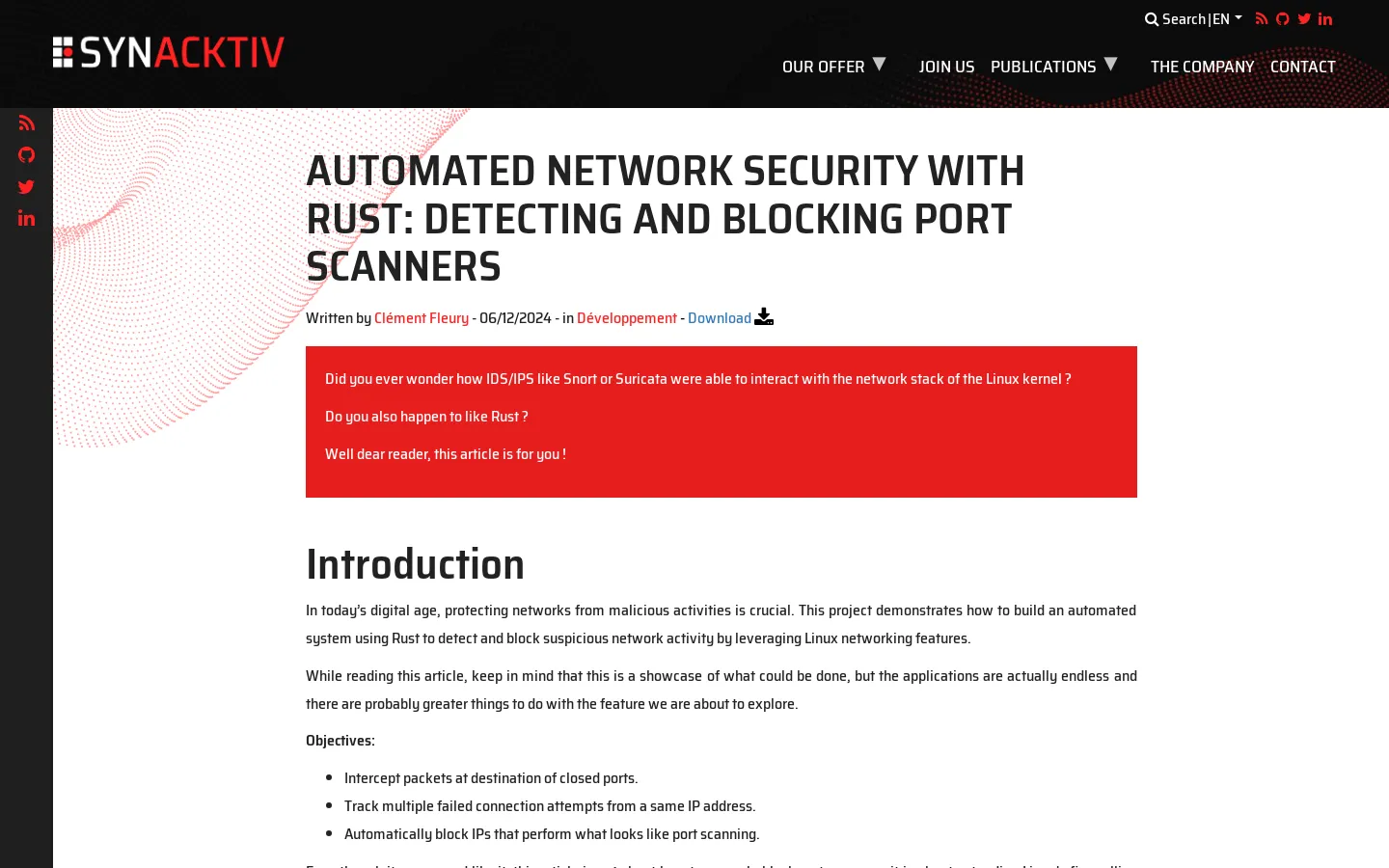
Automated Network Security Enhancements Using Rust and Netfilter
/ 5 min read
Quick take - The article discusses a project aimed at enhancing network security through advanced packet interception techniques using the Netfilter framework in Linux, focusing on intercepting packets to closed ports, tracking failed connection attempts, and blocking malicious IP addresses to improve overall network integrity.
Fast Facts
-
Project Overview: The initiative focuses on enhancing network security through advanced packet interception techniques using the Netfilter framework in Linux, targeting closed ports, tracking failed connections, and blocking malicious IPs.
-
Netfilter Framework: Central to the project, Netfilter allows for customizable rules governing packet treatment, supporting various protocol families (IPv4, IPv6, ARP) for effective traffic management.
-
Security Enhancements: Key improvements include intercepting suspicious packets, monitoring failed connection attempts to identify port scanning, and automating the blocking of IPs exhibiting malicious behavior.
-
Best Practices: Emphasizes understanding Netfilter, organizing rules, leveraging hooks for packet interception, and ensuring effective resource management to avoid common pitfalls in network security.
-
Integration of Tools: Highlights the importance of tools like the nfq crate for real-time packet processing, nftables for advanced firewall rules, and the Netlink API for managing network configurations, creating a robust ecosystem for network management.
Enhancing Network Security through Advanced Packet Interception Techniques
In today’s digital age, safeguarding networks against malicious activities is more critical than ever. As cyber threats evolve, organizations are increasingly focusing on developing robust strategies to protect their systems. A recent project aims to enhance network security by implementing advanced packet interception techniques using the Netfilter framework, a powerful tool within the Linux operating system.
Key Objectives of the Project
The project has three primary objectives: intercepting packets sent to closed ports, tracking failed connection attempts, and blocking malicious IP addresses. These measures are designed to bolster network security by identifying and mitigating potential threats before they can cause harm.
Intercepting Packets to Closed Ports
Closed ports often become targets for probing or potential attacks. By intercepting packets directed at these ports, organizations can detect suspicious activities early. This proactive approach allows security teams to respond swiftly to potential threats, minimizing the risk of successful intrusions.
Tracking Failed Connection Attempts
Monitoring failed connection attempts provides valuable insights into suspicious activities. Repeated failures from the same IP address may indicate port scanning behavior, a common tactic used by attackers to identify vulnerabilities. By tracking these attempts, network administrators can take preemptive actions to secure their systems.
Blocking Malicious IP Addresses
Blocking IP addresses that pose a threat is crucial for maintaining network integrity. Automated mechanisms have been developed to identify and block IPs exhibiting consistent malicious patterns, such as repeated port scans. This not only enhances security but also acts as a deterrent against unauthorized access attempts.
The Role of Netfilter Framework
Central to this initiative is the Netfilter framework, which plays a pivotal role in Linux networking. Netfilter allows users to define rules governing the treatment of network packets as they traverse the Linux kernel. This flexibility is essential for creating tailored security measures that adapt to an organization’s specific needs.
Understanding Protocol Families
Netfilter supports various protocol families, including IPv4, IPv6, ARP, bridge, and netdev. This broad support enables effective management of traffic across different network interfaces and protocols. Leveraging these capabilities is vital for implementing comprehensive security measures.
Defining Custom Rules
To implement these security enhancements, understanding how to define new tables using Netfilter’s configuration file syntax is crucial. Custom rules can be applied to incoming and outgoing packets, allowing for a nuanced approach to network security.
Best Practices for Implementation
Implementing these advanced techniques requires adherence to best practices:
-
Familiarize with Netfilter Framework: A solid grasp of Netfilter underpins many networking operations and serves as a foundation for advanced solutions.
-
Utilize Protocol Families: Awareness of supported protocol families ensures correct packet processing across various protocols.
-
Organize Rules into Chains: Structuring rules within chains defines the sequence of packet processing, improving efficiency.
-
Leverage Hooks for Packet Interception: Mastering the use of kernel hooks enhances filtering and processing capabilities.
Avoiding Common Pitfalls
Developers should be mindful of potential pitfalls:
-
Ensuring Idempotency: Operations should be repeatable without adverse effects to enhance stability.
-
Effective Resource Management: Proper management prevents legitimate users from being inadvertently locked out.
-
Choosing Appropriate Queue Dispatching Algorithms: Selecting suitable algorithms ensures optimal performance under high load.
-
Managing Security Risks: Careful consideration of security measures prevents exploitation by malicious actors.
Advancements in Network Security Protocols
Recent advancements have significantly bolstered defenses against potential threats. The implementation of packet interception systems targeting closed ports has improved monitoring capabilities. Additionally, tracking multiple failed connection attempts aids in identifying port scanning behavior.
An automated mechanism now blocks IP addresses exhibiting consistent scanning patterns, further strengthening network defenses. Understanding the Netfilter framework has been pivotal in these enhancements, enabling advanced firewall capabilities on Linux systems.
Tools and Integration for Robust Networking Solutions
The tutorial emphasizes understanding tool integration within network programming contexts:
-
Rust’s Safety and Performance: Ensures efficient applications with reduced memory management risks.
-
Nfq Crate for Packet Processing: Facilitates real-time inspection and manipulation of packets.
-
Nftables Framework: Allows creation of complex filtering rules adaptable to various conditions.
-
Netlink API: Provides low-level access for customized networking solutions.
Together, these tools form a cohesive ecosystem enabling developers to build secure and adaptable networking applications. Readers are encouraged to explore each tool further through provided resources for deeper learning and practical implementation.



